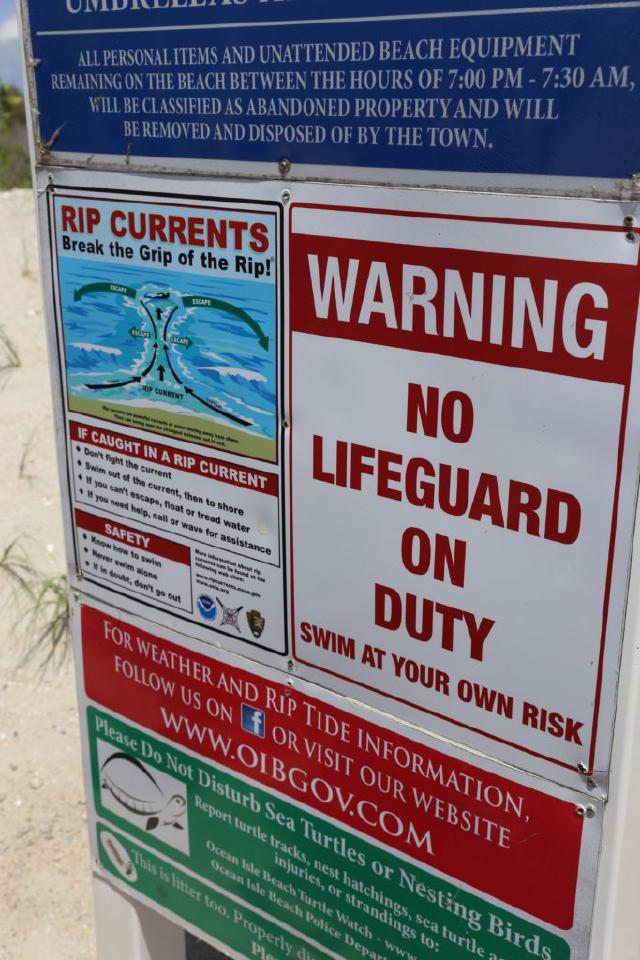Uncrowded, empty stretches of beach. Single family homes lined up behind the dunes. No lifeguard on duty. This is our experience each time we visit the Barrier Islands near Wilmington, North Carolina.

Benefits of a Lifeguard
Since we have a neighborhood pool in walking distance to our home, my teens have chosen lifeguarding as their summer job. They’ve felt the magnitude of the responsibility as they complete the necessary Red Cross training and life saving skills. Lifeguarding isn’t for the faint of heart. It requires hours of work in the heat, watching for potential signs of trouble.
Lifeguards can certainly increase the safety of the swimming experience. Their work allows parents to lounge and take it easy on the side while they watch the children. But, lifeguards can get distracted and overwhelmed. The most ideal solution for a child’s safety in the water is a vigilant adult close by, tending to their individual needs. Think of homeschoolers as that kind of parent–the one who is providing appropriate levels of freedom. Homeschoolers can’t afford to check out.
No Supervision
When you homeschool, you are on your own. You don’t have a mentor; you don’t have a boss; you don’t have anyone telling you what to do. Some states mandate the specific material to be taught, the specific benchmarks to be met or the number of instruction hours a child should receive. But, other than that, it’s quite flexible. There is no one making you start at 8:20 am, and no one that rings the bell to end the school day at 3:50 pm. Though homeschool families may check in with the local school district, they don’t have hourly or even daily requirements. Like a swimmer wanting to avoid the heat of the day, we chose to do our work early in the morning. We don’t have to wait for the beach to be “opened” by the lifeguard. I like our independent educational opportunities.
No One Else to Blame
Some parents expect the lifeguard to be a substitute parent, watching over their children. “You better stop doing that,” one parent may threaten, “or else the lifeguard…” (here the parent casts a meaningful look at the stand) “…will get you in trouble.” The parent wants the lifeguard to back them up.
Lifeguards have a whistle. Lifeguards have authority. Some parents prefer to have their children “listen to the lifeguard” because then they aren’t the one upsetting their child with the rules. These parents don’t want to have to be the bad guy.
As a homeschooler, if things fail, it’s on you. If the kid doesn’t like the rule, it’s on you. This is both the burden and the delight of homeschooling. I love having the flexibility to change what isn’t working. I love having the freedom to set our own rules. But, I remind myself to not get overwhelmed with doing too much at once.
No Additional Help
The lifeguard is another set of eyes, another person scanning the water to make sure everything is OK. As a homeschooler, it’s up to you to build up your community. You are out there swimming at the beach and you need to assemble your team to help you out. You create the situation you want. You invite other families and trusted adults to participate in the involvement of education with your child.
Why Swim Here?
Families choose to swim at beaches without lifeguards even though this means shouldering extra commitments. The beach may be isolated or not popular enough to afford paying a lifeguard. Similarly, families choose to homeschool because the child may want to learn something that isn’t commonly taught at school, and the family wants to customize.
Even though beaches without a lifeguard can be more dangerous, parents taking their child to swim there can be assured of the safety of the child through their own vigilance, their ability to teach and encourage their child, and the team they choose to assemble. Homeschoolers succeed for these same reasons: by treating their children as individuals, staying close enough to understand their challenges, accepting responsibility and building community.